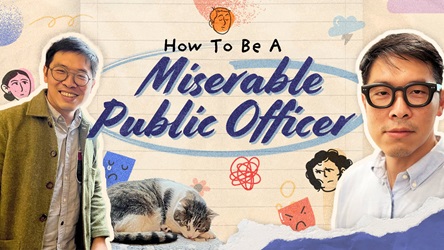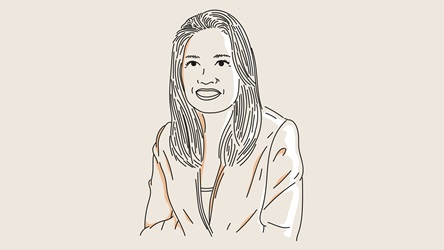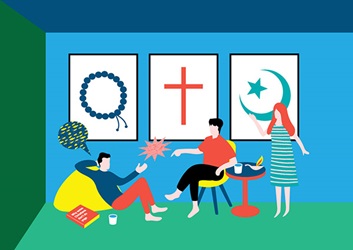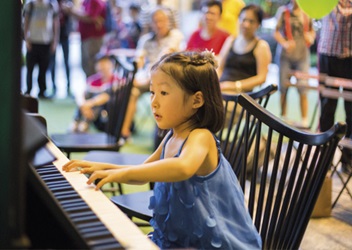Meeting The Needs Of One, Supporting The Greater Whole

ABDUL RAZAK MARICAR
Chief Executive, MUIS – Islamic Religious Council of Singapore, July 2013–Present
Secretary, MUIS, April 2007–July 2013
Senior Assistant Director, Community Relations (Muslim Affairs Unit), then-Ministry of Community Development and Sports, 2002–2007
Dear young officer,
Whether in times of peace or crisis, faith can provide much comfort. Two years ago, when a group of students on a school trip lost their lives in an earthquake in Sabah, MUIS supported the Ministry of Education and the Ministry of Foreign Affairs in Singapore’s consular efforts. Together, we supported the families in their time of sudden and extreme grief, and ensured that the last rites for the victims were carried out respectfully.
That incident is one of many types of issues that MUIS works on to support the Muslim community here – whether it is ensuring sufficient prayer spaces and safe passage for Haj pilgrims, or facilitating halal certification for businesses.
Even as we fulfil the needs of the Muslim community, we ensure that MUIS supports the broader national well-being. In the late 1960s, the first cohort of MUIS officers had to handle the resettlement of families from kampongs to public housing, and the demolition of many mosques to make way for urbanisation.
What helped to soften the blow was the government’s offer to build a new mosque in every new housing estate. When the new mosques were ready, a change of practice was required: the volume for the call to prayer had to be lowered given the densely populated neighbourhoods. But of what use was a prayer call if it was not loud enough to be heard? A solution was found: Muslims would get to hear the prayer call at home on the radio.
Such early experiences in dealing with difficult issues have made generations of MUIS officers sensitive to balancing the community’s needs with those of the broader Singapore society – negotiating practices without compromising the spirit of humanity within the faith. Given its regular engagement with leaders and many successes in finding common ground and practical solutions, MUIS has been entrusted with more resources to do more, not only for the Muslims but also to bring them closer to other communities.
For example, mosques in Singapore have evolved beyond being merely places for worship and religious learning. They have become important institutions that work with community groups and government agencies to deliver critical services to the wider community.

The Harmony Centre, co-located with the An-Nahdhah Mosque in Bishan, is the beacon of the community’s contribution towards religious harmony in Singapore. Beyond running ad-hoc activities, the Centre’s work covers capacity building, engagement and learning. Through its programmes, people ranging from students to diplomats learn about Singapore’s model of religious harmony. MUIS’ Distinguished Visitors Programme has brought eminent theologians (e.g., the Sheikh of Al-Azhar, the Archbishop of Canterbury) to share their perspectives on faith. Most importantly, the centre creates spaces for different faith communities to learn about one another at a deeper level. In the process of working together, we learn to appreciate our common aspirations and challenges – this approach applies as well to public officers working across agencies for common goals.
New challenges will continue to test our faith communities and nation. Militant groups around the world are distorting religion to secure support for political violence from the unsuspecting. Social media has become their main platform to propagate captivating but misleading messages to attract vulnerable youths to their cause. To address this, MUIS formed the Asatizah Youth Network, a group of savvy young religious leaders whose task is to engage young people, offer them proper religious guidance and promote counter-extremism narratives. With the support of agencies such as the Ministry of Culture, Community and Youth, the Ministry of Home Affairs and the National Security Coordination Secretariat, MUIS equips these leaders with the necessary skills and tools to expand their reach and create an impact. Together, we can all play our part to be vigilant and discerning.
Also hurting social cohesion in the region is the spread of exclusivist ideas through charismatic foreign preachers. With the introduction of the mandatory Asatizah Recognition Scheme in January 2017, all religious teachers and Islamic education centres and providers are required to be registered with MUIS. Through this regulatory measure, MUIS has been able to ensure that only qualified religious teachers and approved centres and providers are offering Islamic education that is suited for Singapore's multi-religious context. This has helped to safeguard against the spread of exclusivist ideas.
Singapore is a nation of many races and religions. MUIS has always endeavoured to nurture good values and promote mutual respect and trust. Only then can our diversity be celebrated, and become a positive force in the forging of our national identity.
MUIS’ work in meeting the needs of one community, while supporting the greater whole of society, is mirrored in the work of all public agencies regardless of each agency’s unique role. As public officers, we often may not realise how important it is to keep working at finding whole-of-government solutions, even though problems may seem insurmountable. Our pioneers have shown the way by working together and never giving up. Such values remain important as the Public Service faces new complex challenges in the years ahead.
- POSTED ON
Feb 5, 2018
- TEXT BY
Abdul Razak Maricar
- ILLUSTRATION BY
Mushroomhead
-
Feature
Let's Talk About Religion









